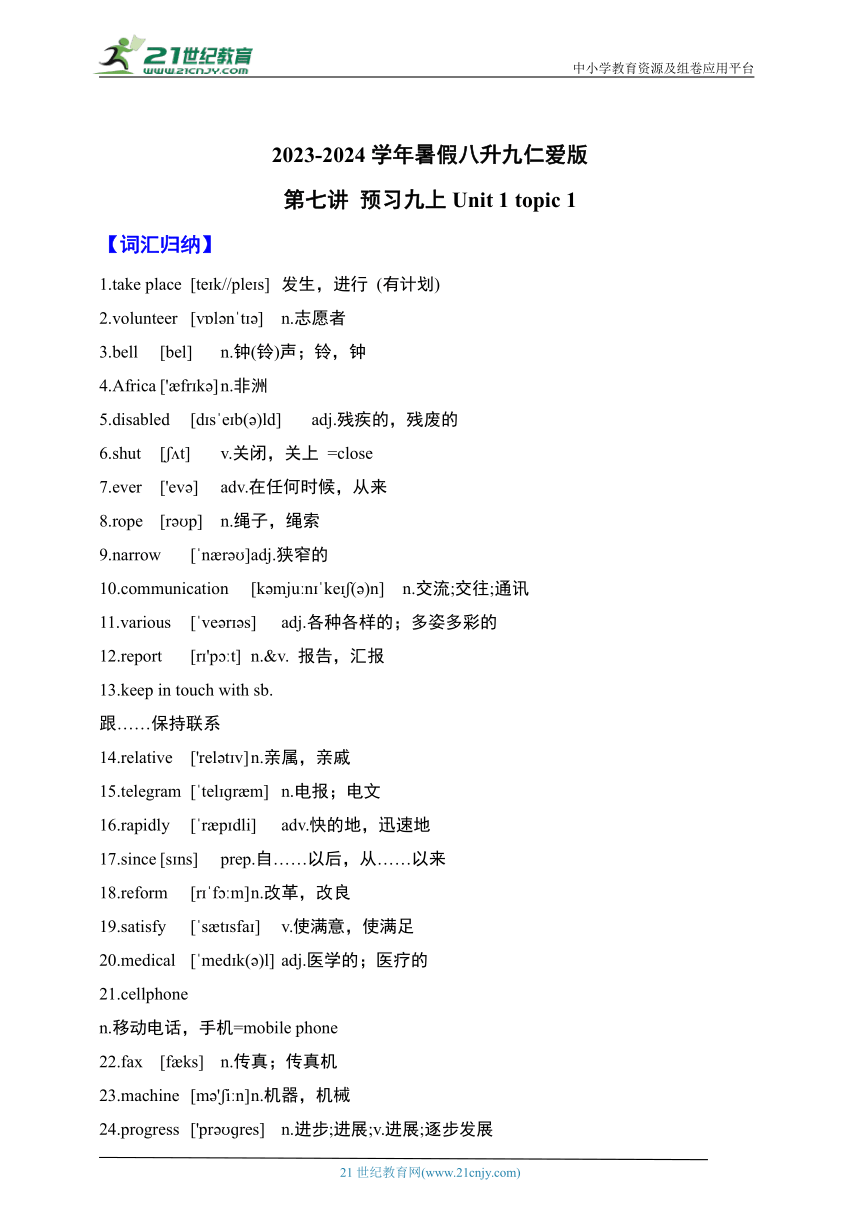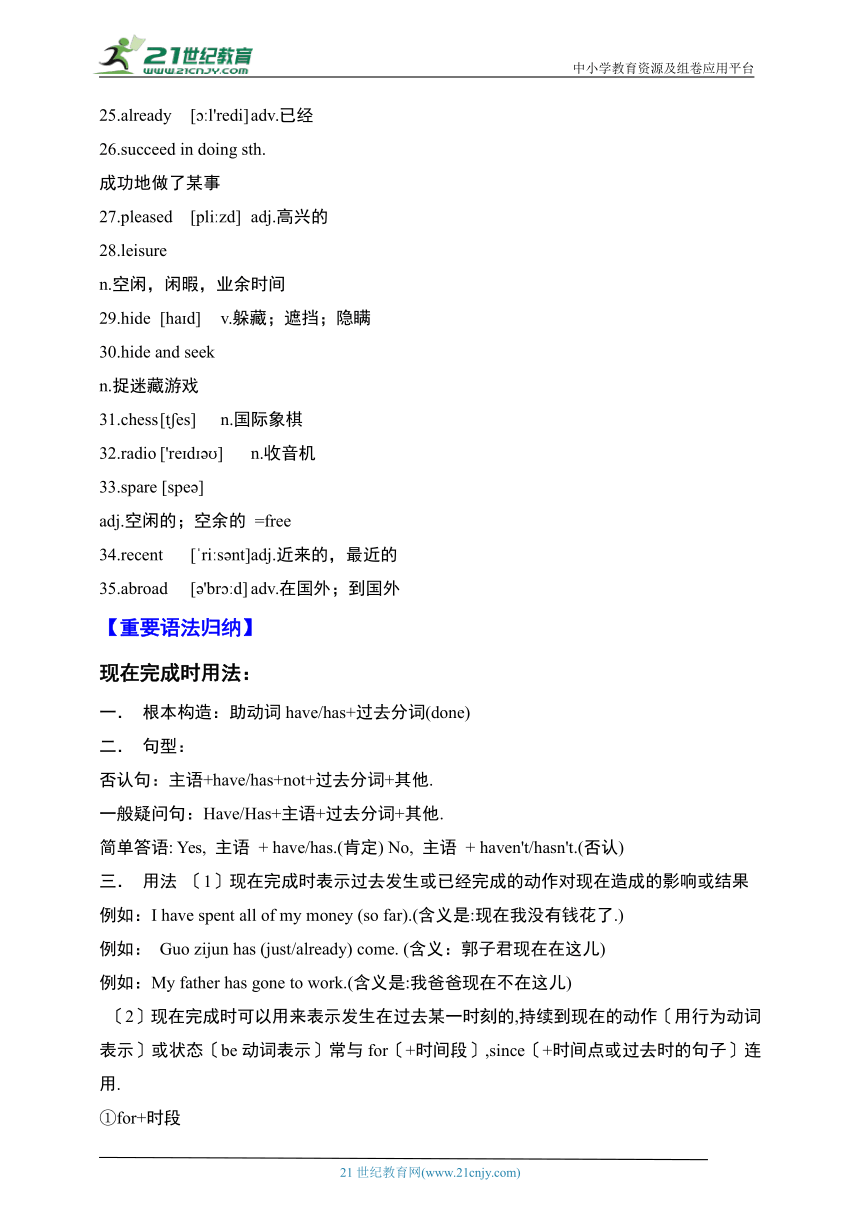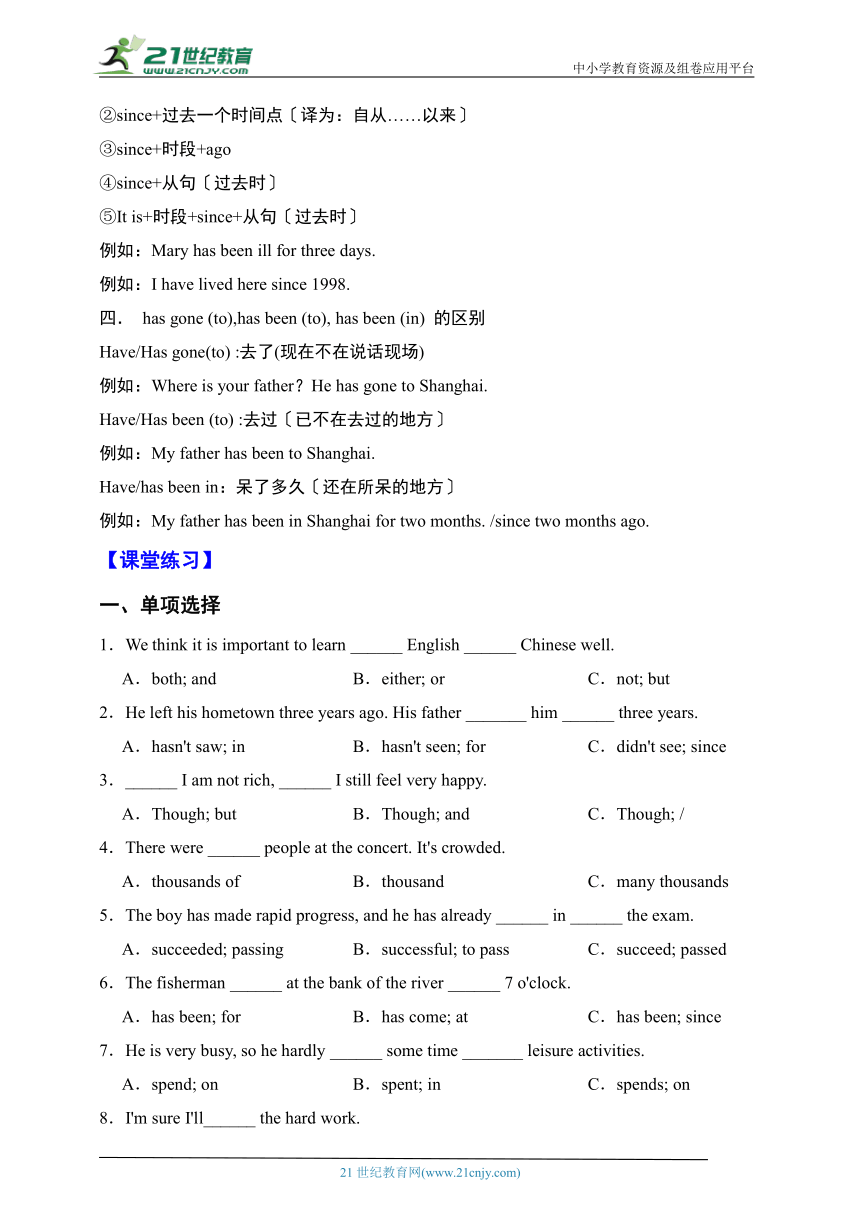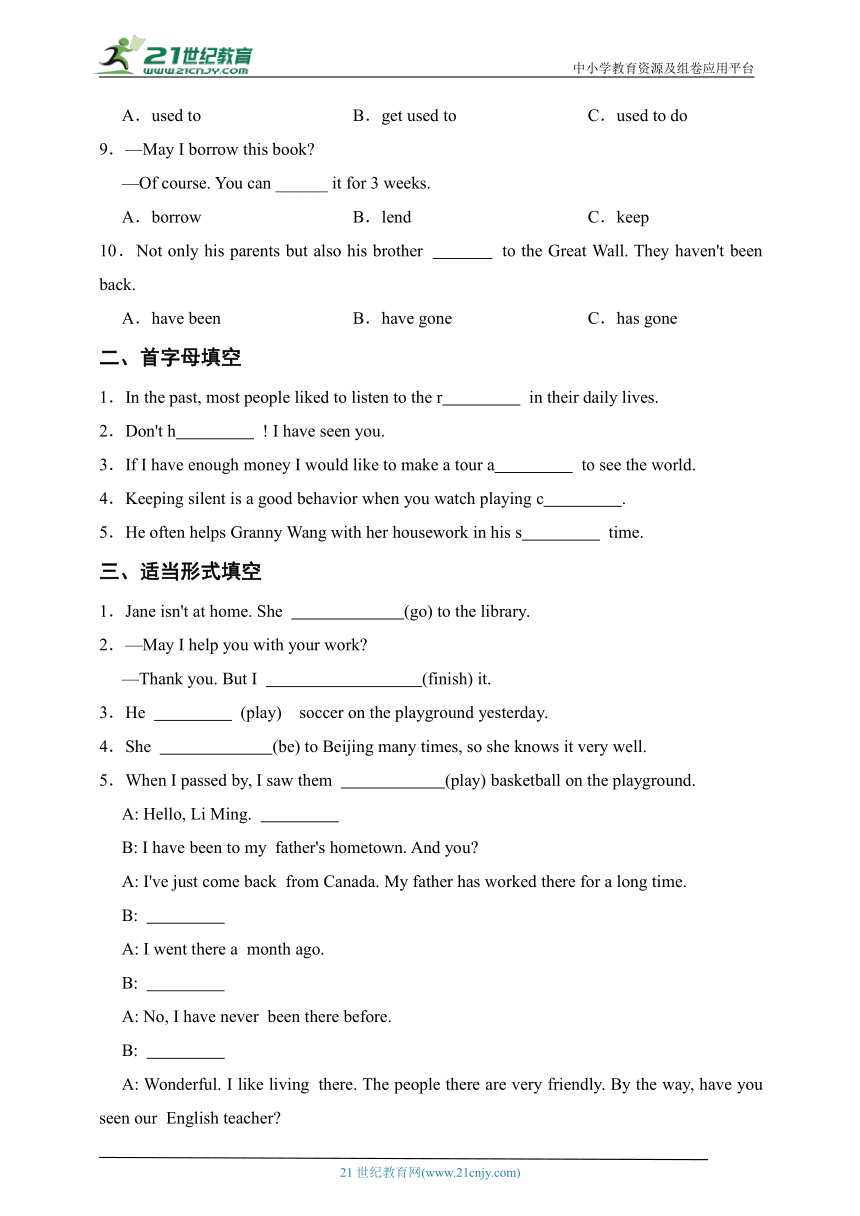2023-2024学年暑假八升九仁爱版第七讲预习九上Unit 1 Topic 1 Our country has developed rapidly (含解析)
文档属性
| 名称 | 2023-2024学年暑假八升九仁爱版第七讲预习九上Unit 1 Topic 1 Our country has developed rapidly (含解析) |

|
|
| 格式 | docx | ||
| 文件大小 | 289.2KB | ||
| 资源类型 | 试卷 | ||
| 版本资源 | 仁爱科普版 | ||
| 科目 | 英语 | ||
| 更新时间 | 2024-06-06 00:00:00 | ||
图片预览





文档简介
中小学教育资源及组卷应用平台
2023-2024学年暑假八升九仁爱版
第七讲 预习九上Unit 1 topic 1
【词汇归纳】
1.take place [te k//ple s] 发生,进行 (有计划)
2.volunteer [v l n t ] n.志愿者
3.bell [bel] n.钟(铃)声;铃,钟
4.Africa [' fr k ] n.非洲
5.disabled [d s e b( )ld] adj.残疾的,残废的
6.shut [ t] v.关闭,关上 =close
7.ever ['ev ] adv.在任何时候,从来
8.rope [r p] n.绳子,绳索
9.narrow [ n r ] adj.狭窄的
munication [k mju n ke ( )n] n.交流;交往;通讯
11.various [ ve r s] adj.各种各样的;多姿多彩的
12.report [r 'p t] n.&v. 报告,汇报
13.keep in touch with sb.
跟……保持联系
14.relative ['rel t v] n.亲属,亲戚
15.telegram [ tel ɡr m] n.电报;电文
16.rapidly [ r p dli] adv.快的地,迅速地
17.since [s ns] prep.自……以后,从……以来
18.reform [r f m] n.改革,改良
19.satisfy [ s t sfa ] v.使满意,使满足
20.medical [ med k( )l] adj.医学的;医疗的
21.cellphone
n.移动电话,手机=mobile phone
22.fax [f ks] n.传真;传真机
23.machine [m ' i n] n.机器,机械
24.progress ['pr ɡres] n.进步;进展;v.进展;逐步发展
25.already [ l'redi] adv.已经
26.succeed in doing sth.
成功地做了某事
27.pleased [pli zd] adj.高兴的
28.leisure
n.空闲,闲暇,业余时间
29.hide [ha d] v.躲藏;遮挡;隐瞒
30.hide and seek
n.捉迷藏游戏
31.chess [t es] n.国际象棋
32.radio ['re d ] n.收音机
33.spare [spe ]
adj.空闲的;空余的 =free
34.recent [ ri s nt] adj.近来的,最近的
35.abroad [ 'br d] adv.在国外;到国外
【重要语法归纳】
现在完成时用法:
根本构造:助动词have/has+过去分词(done)
句型:
否认句:主语+have/has+not+过去分词+其他.
一般疑问句:Have/Has+主语+过去分词+其他.
简单答语: Yes, 主语 + have/has.(肯定) No, 主语 + haven't/hasn't.(否认)
用法 〔1〕现在完成时表示过去发生或已经完成的动作对现在造成的影响或结果
例如:I have spent all of my money (so far).(含义是:现在我没有钱花了.)
例如: Guo zijun has (just/already) come. (含义:郭子君现在在这儿)
例如:My father has gone to work.(含义是:我爸爸现在不在这儿)
〔2〕现在完成时可以用来表示发生在过去某一时刻的,持续到现在的动作〔用行为动词表示〕或状态〔be动词表示〕常与for〔+时间段〕,since〔+时间点或过去时的句子〕连用.
①for+时段
②since+过去一个时间点〔译为:自从……以来〕
③since+时段+ago
④since+从句〔过去时〕
⑤It is+时段+since+从句〔过去时〕
例如:Mary has been ill for three days.
例如:I have lived here since 1998.
has gone (to),has been (to), has been (in) 的区别
Have/Has gone(to) :去了(现在不在说话现场)
例如:Where is your father?He has gone to Shanghai.
Have/Has been (to) :去过〔已不在去过的地方〕
例如:My father has been to Shanghai.
Have/has been in:呆了多久〔还在所呆的地方〕
例如:My father has been in Shanghai for two months. /since two months ago.
【课堂练习】
单项选择
1.We think it is important to learn ______ English ______ Chinese well.
A.both; and B.either; or C.not; but
2.He left his hometown three years ago. His father _______ him ______ three years.
A.hasn't saw; in B.hasn't seen; for C.didn't see; since
3.______ I am not rich, ______ I still feel very happy.
A.Though; but B.Though; and C.Though; /
4.There were ______ people at the concert. It's crowded.
A.thousands of B.thousand C.many thousands
5.The boy has made rapid progress, and he has already ______ in ______ the exam.
A.succeeded; passing B.successful; to pass C.succeed; passed
6.The fisherman ______ at the bank of the river ______ 7 o'clock.
A.has been; for B.has come; at C.has been; since
7.He is very busy, so he hardly ______ some time _______ leisure activities.
A.spend; on B.spent; in C.spends; on
8.I'm sure I'll______ the hard work.
A.used to B.get used to C.used to do
9.—May I borrow this book
—Of course. You can ______ it for 3 weeks.
A.borrow B.lend C.keep
10.Not only his parents but also his brother to the Great Wall. They haven't been back.
A.have been B.have gone C.has gone
二、首字母填空
1.In the past, most people liked to listen to the r in their daily lives.
2.Don't h ! I have seen you.
3.If I have enough money I would like to make a tour a to see the world.
4.Keeping silent is a good behavior when you watch playing c .
5.He often helps Granny Wang with her housework in his s time.
三、适当形式填空
1.Jane isn't at home. She (go) to the library.
2.—May I help you with your work
—Thank you. But I (finish) it.
3.He (play) soccer on the playground yesterday.
4.She (be) to Beijing many times, so she knows it very well.
5.When I passed by, I saw them (play) basketball on the playground.
A: Hello, Li Ming.
B: I have been to my
father's hometown. And you
A: I've just come back
from Canada. My father has worked there for a long time.
B:
A: I went there a
month ago.
B:
A: No, I have never
been there before.
B:
A: Wonderful. I like living
there. The people there are very friendly. By the way, have you seen our
English teacher
B:
I saw him just now.
A:Listen! There goes the bell.
B:
Let's go.
A. When did you go there B. Yes, I have. C. What do you think of Canada D.
Have you ever been there E.
Where have you been
五、阅读理解
读短文,从每题所给的A.B.C三个选项中选出最佳答案回答或完成句子。
My grandfather is eighty years old now. He always complains about how fast things have changed, and he often says that life used to be better.
Families aren't families they used to be. A lot of families have broken up. If husband and wife have problems with their marriage, they no longer stay together. And mothers used to stay at home and take care of their children, but now not any more. Everyone is busy working. Mother used to spend all day cooking in the kitchen. But now the family don't eat home-cooked food any more.
And the cars! No one walks any more. More and more people drive. Students used to walk 5 miles to school every day, even in winter. But now students don't. And in school, children don't have to think any more. In math class, for example, they used to add, subtract, multiply and divide(加减乘除)in their heads. Instead, they use calculators(计算器).
And people today have TV and computers, and they don't talk to each other any more. They are too busy to talk, too busy to eat, too busy to think….
Life used to be simple, but it isn't any more.
1.What does my grandfather think of the life now
A.He thinks the life is the same as it used to be.
B.He thinks the life now is worse than it used to be.
C.He thinks the life now is better than it used to be.
2.What does the underlined word "marriage" mean in Chinese
A.生活 B.工作 C.婚姻
3.What has happened these years according to the passage
A.Children don't have to think any more in school.
B.Students use calculators in math class.
C.Both of them.
4.What changes have happened to some families
a. People have TV.
b. People like to eat home-cooked food.
c. Lots of families have computers.
d. Lots of couples(夫妇)live apart because of unhappy problems.
A.a, b, d B.b, c, d C.a, c , d
5.Which is TRUE according to the passage
A.Life now is much simpler.
B.People are too busy to talk with each other now.
C.Lots of mothers stay at home and look after their children.
【答案解析】
一、1.【答案】A
【解析】【分析】句意:我们认为学好英语和汉语是很重要的。A两个都,B要么......要么,C不是......而是......,根据English,Chinese,可知两个都重要,故选A。
【点评】考查连词辨析,注意识记 both...and的用法。
2.【答案】B
【解析】【分析】句意:他三年前离开了家乡。他父亲已经三年没见过他了。three years是段时间,其前用for,是现在完成时标志,saw是动词过去式,seen是过去分词,故选B。
【点评】考查现在完成时,注意识记for+段时间,过去分词seen的用法。
3.【答案】C
【解析】【分析】句意:虽然我不富有,但我仍然感到很快乐。though,尽管,虽然,引导让步状语从句不与but连用,故选C。
【点评】考查连词,注意识记though引导让步状语从句不与but连用的用法。
4.【答案】A
【解析】【分析】句意:音乐会有成千上万的人。它是拥挤的。基数词+thousand,几千,thousands of,数以……计的,没有基数词,故用thousands of,故选A。
【点评】考查数词辨析,注意识记thousands of的用法。
5.【答案】A
【解析】【分析】句意:这个男孩进步很快,他已经成功地通过了考试。successful,形容词,成功的,succeed in doing sth,成功做某事,故空一根据助动词had,可知时态是过去完成时,故过去分词 succeeded,空二用动名词passing,故选A。
【点评】考查现在完成时,注意识记succeed in doing sth的用法。
6.【答案】C
【解析】【分析】句意:渔夫从七点钟起就一直在河边。8 o'clock是点时间,since+时间点,是现在完成时标志,搭配持续动词,come是瞬间动词,持续动词是have been,故选C。
【点评】考查持续动词,注意识记since+时间点,是现在完成时标志,搭配持续动词的用法。
7.【答案】C
【解析】【分析】句意:他很忙,所以很少花时间做休闲活动。spend some time on sth,固定搭配,把时间花在……上,hardly是一般现在时标志,主语是第三人称单数,故谓语动词有单三式,spends是单三式,故选C。
【点评】考查固定搭配,注意识记spend some time on sth,主谓一致的用法。
8.【答案】B
【解析】【分析】句意:我相信我会习惯这种艰苦的工作。used to (do),过去常常做(某事) get used to sth,习惯于……,根据宾语是work,可知表示习惯,故选B。
【点评】考查短语辨析,注意识记get used to的用法。
9.【答案】C
【解析】【分析】句意:——我可以借这本书吗?——当然可以。您可以借三个星期。A借来,瞬间多次,B借给,瞬间多次,C借,持续动词,for 3 weeks段时间搭配持续动词,故选C。
【点评】考查动词辨析,注意识记keep是持续动词的用法。
10.【答案】C
【解析】【分析】句意:不仅他的父母,而且他的兄弟也去了长城。他们还没有回来。have been to+地点名词,表示已经去了某地,去了回来了;have gone to+地点名词,表示去过某地,去了还没有回来。根据They haven't been back.可知是去了还没回来,用have gone,排除A。not only....but also谓语动词遵循就近原则,看离谓语最近的名词单复数,离谓语最近的名词是brother,指的是单数,所以用has,故选C。
【点评】考查短语辨析和就近原则,首先识记have been/gone to+地点名词的区别,然后根据关键词句They haven't been back.确定。
二、1.【答案】radio
【解析】【分析】 句意:在过去,大多数人在日常生活中喜欢听收音机。the定冠词修饰名词,根据listen to和首字母提示可知是听收音机,radio,是名词,故填radio。
【点评】考查单词拼写,注意识记radio的用法。
2.【答案】hide
【解析】【分析】 句意:不要藏了!我看见你了。根据 I have seen you和首字母提示,可知是祈使句,不要藏了,hide是动词原形,否定祈使句是Don't+动词原形,故填hide。
【点评】考查单词拼写,注意识记hide,否定祈使句的用法。
3.【答案】abroad
【解析】【分析】 句意:如果我有足够的钱,我想出国旅游看看世界。根据see the world和首字母提示,可知是出国旅游,make a tour abroad,故填abroad。
【点评】考查单词拼写,注意识记make a tour abroad的用法。
4.【答案】chess
【解析】【分析】 句意:看象棋时保持沉默是一种好行为。根据play汉和首字母提示是下棋,play chess,固定搭配,故填chess。
【点评】考查单词拼写,注意识记chess的用法。
5.【答案】spare
【解析】【分析】 句意:他经常在业余时间帮助王奶奶做家务。根据helps Granny Wang with her housework和首字母提示是在业余时间,in one's spare time,time是名词,其前用形容词作定语,spare是形容词,业余的,故填spare。
【点评】考查单词拼写,注意识记spare的用法。
三、1.【答案】has gone
【解析】【分析】句意:简不在家。她去了图书馆。go去,根据Jane isn't at home.可知她去了图书馆还没回来,时态为现在完成时,用have/has gone to表示已去未回,主语she为第三人称单数,助动词用has,故填has gone。
【点评】考查现在完成时,注意识记have/has gone to的用法。
2.【答案】have finished
【解析】【分析】句意:——我可以帮你工作吗?——谢谢你。但我完成了。finish完成,根据句意可知他已经完成工作了,用现在完成时强调过去的动作对现在的影响,结构为have/has+done,主语I为第一人称,助动词用have,故填have finished。
【点评】考查现在完成时,注意识记现在完成时的用法。
3.【答案】played
【解析】【分析】句意:他昨天在操场上踢足球。play玩,根据yesterday,可知时态为一般过去时,应填动词过去式,故填played。
【点评】考查一般过去时,注意识记一般过去时的用法。
4.【答案】has been
【解析】【分析】句意:她去过北京很多次,所以她非常了解北京。根据many times,可知是去过北京好多次,已经回来了,时态为现在完成时,结构为have/has been to,主语she为第三人称单数,助动词用has,故填has been。
【点评】考查现在完成时,注意识记have/has been to的用法。
5.【答案】playing
【解析】【分析】句意:当我路过时,我看见他们在操场上打篮球。play玩,根据When I passed by,可知是路过的时候他们正在打篮球,see sb doing sth,看见某人正在做某事,固定搭配,故填playing。
【点评】考查过去进行时,注意识记过去进行时的用法。
四、【答案】1-5 E;A;D;C;B
【解析】【分析】短文大意:这是一组讨论去某地的对话。
选项意思:
A. When did you go there 你什么时候去的
B. Yes, I have.是的,我看见了。
C. What do you think of Canada 你觉得加拿大怎么样
D. Have you ever been there 你去过那儿吗
E. Where have you been 你去哪儿了
(1)根据答语I have been to my father's hometown.,可知问句是“你去哪里了?”结合选项可知E符合题意,故答案为E。
(2)根据下文答语 I went there a month ago可知问句是“你什么时候去的?”结合选项可知A符合题意,故答案为A。
(3)根据答语No, I have never been there before.可知问句是“你曾经去过那里吗?”故答案为D。
(4)根据答语Wonderful. I like living there. 可知上文是问“你认为加拿大怎么样?”故答案为C。
(5)根据上文问句have you seen our English teacher 和I saw him just now.可知回答是“是的,我看见了。”故答案为B。
【点评】考查补全对话。要紧扣话题,根据上下文逻辑关系和语境回答问题,注意前后的呼应。
五、【答案】1.B2.C3.C4.C5.B
【解析】【分析】本文讲的是自己80岁的爷爷对现如今生活的抱怨,总感觉没有以前的美好,温暖了,婚姻的破裂,现代科技使人们的距离变远,亲情淡漠等,看不到美好的生活一面。
【点评】考查阅读理解。本文涉及细节题,推断题,词义猜测题,细节题要注意从文中寻找答案;推断题需要联系上下文,推断出需要的信息,词义猜测题需要根据上下文提炼相关信息锁定词意。
1.推断题。根据He always complains about how fast things have changed, and he often says that life used to be better他总是抱怨事情变化得多么快,他经常说生活过去是更好的,可知老人认为如今的生活变得比以前更糟糕了,故选B。
2.词义辨析题。根据 If husband and wife have problems with their,可知夫妻的出现问题,是婚姻问题,故marriage是婚姻的意思。故选C。
3.细节题。根据And in school, children don't have to think any more,可知在学校里,孩子们不用再思考了,根据In math class,they used to add, subtract, multiply and divide in their heads Instead, they use calculators在数学课上,他们习惯在脑子里做加减乘除。相反,他们使用计算器,可知A和B选项都是正确的,故选C。
4.细节题。根据people today have TV and computers现在的人们有了电视和电脑,A lot of families have broken up. If husband and wife have problems with their marriage, they no longer stay together很多家庭都破裂了。如果夫妻的婚姻出现问题,他们就不会再在一起了,可知许多夫妻分居是因为不愉快的问题,故C选项是正确的,故选C。
5.推断题。根据they don't talk to each other any more. They are too busy to talk,可知现在人们太忙了,没有时间互相交谈,故选B。
21世纪教育网 www.21cnjy.com 精品试卷·第 2 页 (共 2 页)
21世纪教育网(www.21cnjy.com)
2023-2024学年暑假八升九仁爱版
第七讲 预习九上Unit 1 topic 1
【词汇归纳】
1.take place [te k//ple s] 发生,进行 (有计划)
2.volunteer [v l n t ] n.志愿者
3.bell [bel] n.钟(铃)声;铃,钟
4.Africa [' fr k ] n.非洲
5.disabled [d s e b( )ld] adj.残疾的,残废的
6.shut [ t] v.关闭,关上 =close
7.ever ['ev ] adv.在任何时候,从来
8.rope [r p] n.绳子,绳索
9.narrow [ n r ] adj.狭窄的
munication [k mju n ke ( )n] n.交流;交往;通讯
11.various [ ve r s] adj.各种各样的;多姿多彩的
12.report [r 'p t] n.&v. 报告,汇报
13.keep in touch with sb.
跟……保持联系
14.relative ['rel t v] n.亲属,亲戚
15.telegram [ tel ɡr m] n.电报;电文
16.rapidly [ r p dli] adv.快的地,迅速地
17.since [s ns] prep.自……以后,从……以来
18.reform [r f m] n.改革,改良
19.satisfy [ s t sfa ] v.使满意,使满足
20.medical [ med k( )l] adj.医学的;医疗的
21.cellphone
n.移动电话,手机=mobile phone
22.fax [f ks] n.传真;传真机
23.machine [m ' i n] n.机器,机械
24.progress ['pr ɡres] n.进步;进展;v.进展;逐步发展
25.already [ l'redi] adv.已经
26.succeed in doing sth.
成功地做了某事
27.pleased [pli zd] adj.高兴的
28.leisure
n.空闲,闲暇,业余时间
29.hide [ha d] v.躲藏;遮挡;隐瞒
30.hide and seek
n.捉迷藏游戏
31.chess [t es] n.国际象棋
32.radio ['re d ] n.收音机
33.spare [spe ]
adj.空闲的;空余的 =free
34.recent [ ri s nt] adj.近来的,最近的
35.abroad [ 'br d] adv.在国外;到国外
【重要语法归纳】
现在完成时用法:
根本构造:助动词have/has+过去分词(done)
句型:
否认句:主语+have/has+not+过去分词+其他.
一般疑问句:Have/Has+主语+过去分词+其他.
简单答语: Yes, 主语 + have/has.(肯定) No, 主语 + haven't/hasn't.(否认)
用法 〔1〕现在完成时表示过去发生或已经完成的动作对现在造成的影响或结果
例如:I have spent all of my money (so far).(含义是:现在我没有钱花了.)
例如: Guo zijun has (just/already) come. (含义:郭子君现在在这儿)
例如:My father has gone to work.(含义是:我爸爸现在不在这儿)
〔2〕现在完成时可以用来表示发生在过去某一时刻的,持续到现在的动作〔用行为动词表示〕或状态〔be动词表示〕常与for〔+时间段〕,since〔+时间点或过去时的句子〕连用.
①for+时段
②since+过去一个时间点〔译为:自从……以来〕
③since+时段+ago
④since+从句〔过去时〕
⑤It is+时段+since+从句〔过去时〕
例如:Mary has been ill for three days.
例如:I have lived here since 1998.
has gone (to),has been (to), has been (in) 的区别
Have/Has gone(to) :去了(现在不在说话现场)
例如:Where is your father?He has gone to Shanghai.
Have/Has been (to) :去过〔已不在去过的地方〕
例如:My father has been to Shanghai.
Have/has been in:呆了多久〔还在所呆的地方〕
例如:My father has been in Shanghai for two months. /since two months ago.
【课堂练习】
单项选择
1.We think it is important to learn ______ English ______ Chinese well.
A.both; and B.either; or C.not; but
2.He left his hometown three years ago. His father _______ him ______ three years.
A.hasn't saw; in B.hasn't seen; for C.didn't see; since
3.______ I am not rich, ______ I still feel very happy.
A.Though; but B.Though; and C.Though; /
4.There were ______ people at the concert. It's crowded.
A.thousands of B.thousand C.many thousands
5.The boy has made rapid progress, and he has already ______ in ______ the exam.
A.succeeded; passing B.successful; to pass C.succeed; passed
6.The fisherman ______ at the bank of the river ______ 7 o'clock.
A.has been; for B.has come; at C.has been; since
7.He is very busy, so he hardly ______ some time _______ leisure activities.
A.spend; on B.spent; in C.spends; on
8.I'm sure I'll______ the hard work.
A.used to B.get used to C.used to do
9.—May I borrow this book
—Of course. You can ______ it for 3 weeks.
A.borrow B.lend C.keep
10.Not only his parents but also his brother to the Great Wall. They haven't been back.
A.have been B.have gone C.has gone
二、首字母填空
1.In the past, most people liked to listen to the r in their daily lives.
2.Don't h ! I have seen you.
3.If I have enough money I would like to make a tour a to see the world.
4.Keeping silent is a good behavior when you watch playing c .
5.He often helps Granny Wang with her housework in his s time.
三、适当形式填空
1.Jane isn't at home. She (go) to the library.
2.—May I help you with your work
—Thank you. But I (finish) it.
3.He (play) soccer on the playground yesterday.
4.She (be) to Beijing many times, so she knows it very well.
5.When I passed by, I saw them (play) basketball on the playground.
A: Hello, Li Ming.
B: I have been to my
father's hometown. And you
A: I've just come back
from Canada. My father has worked there for a long time.
B:
A: I went there a
month ago.
B:
A: No, I have never
been there before.
B:
A: Wonderful. I like living
there. The people there are very friendly. By the way, have you seen our
English teacher
B:
I saw him just now.
A:Listen! There goes the bell.
B:
Let's go.
A. When did you go there B. Yes, I have. C. What do you think of Canada D.
Have you ever been there E.
Where have you been
五、阅读理解
读短文,从每题所给的A.B.C三个选项中选出最佳答案回答或完成句子。
My grandfather is eighty years old now. He always complains about how fast things have changed, and he often says that life used to be better.
Families aren't families they used to be. A lot of families have broken up. If husband and wife have problems with their marriage, they no longer stay together. And mothers used to stay at home and take care of their children, but now not any more. Everyone is busy working. Mother used to spend all day cooking in the kitchen. But now the family don't eat home-cooked food any more.
And the cars! No one walks any more. More and more people drive. Students used to walk 5 miles to school every day, even in winter. But now students don't. And in school, children don't have to think any more. In math class, for example, they used to add, subtract, multiply and divide(加减乘除)in their heads. Instead, they use calculators(计算器).
And people today have TV and computers, and they don't talk to each other any more. They are too busy to talk, too busy to eat, too busy to think….
Life used to be simple, but it isn't any more.
1.What does my grandfather think of the life now
A.He thinks the life is the same as it used to be.
B.He thinks the life now is worse than it used to be.
C.He thinks the life now is better than it used to be.
2.What does the underlined word "marriage" mean in Chinese
A.生活 B.工作 C.婚姻
3.What has happened these years according to the passage
A.Children don't have to think any more in school.
B.Students use calculators in math class.
C.Both of them.
4.What changes have happened to some families
a. People have TV.
b. People like to eat home-cooked food.
c. Lots of families have computers.
d. Lots of couples(夫妇)live apart because of unhappy problems.
A.a, b, d B.b, c, d C.a, c , d
5.Which is TRUE according to the passage
A.Life now is much simpler.
B.People are too busy to talk with each other now.
C.Lots of mothers stay at home and look after their children.
【答案解析】
一、1.【答案】A
【解析】【分析】句意:我们认为学好英语和汉语是很重要的。A两个都,B要么......要么,C不是......而是......,根据English,Chinese,可知两个都重要,故选A。
【点评】考查连词辨析,注意识记 both...and的用法。
2.【答案】B
【解析】【分析】句意:他三年前离开了家乡。他父亲已经三年没见过他了。three years是段时间,其前用for,是现在完成时标志,saw是动词过去式,seen是过去分词,故选B。
【点评】考查现在完成时,注意识记for+段时间,过去分词seen的用法。
3.【答案】C
【解析】【分析】句意:虽然我不富有,但我仍然感到很快乐。though,尽管,虽然,引导让步状语从句不与but连用,故选C。
【点评】考查连词,注意识记though引导让步状语从句不与but连用的用法。
4.【答案】A
【解析】【分析】句意:音乐会有成千上万的人。它是拥挤的。基数词+thousand,几千,thousands of,数以……计的,没有基数词,故用thousands of,故选A。
【点评】考查数词辨析,注意识记thousands of的用法。
5.【答案】A
【解析】【分析】句意:这个男孩进步很快,他已经成功地通过了考试。successful,形容词,成功的,succeed in doing sth,成功做某事,故空一根据助动词had,可知时态是过去完成时,故过去分词 succeeded,空二用动名词passing,故选A。
【点评】考查现在完成时,注意识记succeed in doing sth的用法。
6.【答案】C
【解析】【分析】句意:渔夫从七点钟起就一直在河边。8 o'clock是点时间,since+时间点,是现在完成时标志,搭配持续动词,come是瞬间动词,持续动词是have been,故选C。
【点评】考查持续动词,注意识记since+时间点,是现在完成时标志,搭配持续动词的用法。
7.【答案】C
【解析】【分析】句意:他很忙,所以很少花时间做休闲活动。spend some time on sth,固定搭配,把时间花在……上,hardly是一般现在时标志,主语是第三人称单数,故谓语动词有单三式,spends是单三式,故选C。
【点评】考查固定搭配,注意识记spend some time on sth,主谓一致的用法。
8.【答案】B
【解析】【分析】句意:我相信我会习惯这种艰苦的工作。used to (do),过去常常做(某事) get used to sth,习惯于……,根据宾语是work,可知表示习惯,故选B。
【点评】考查短语辨析,注意识记get used to的用法。
9.【答案】C
【解析】【分析】句意:——我可以借这本书吗?——当然可以。您可以借三个星期。A借来,瞬间多次,B借给,瞬间多次,C借,持续动词,for 3 weeks段时间搭配持续动词,故选C。
【点评】考查动词辨析,注意识记keep是持续动词的用法。
10.【答案】C
【解析】【分析】句意:不仅他的父母,而且他的兄弟也去了长城。他们还没有回来。have been to+地点名词,表示已经去了某地,去了回来了;have gone to+地点名词,表示去过某地,去了还没有回来。根据They haven't been back.可知是去了还没回来,用have gone,排除A。not only....but also谓语动词遵循就近原则,看离谓语最近的名词单复数,离谓语最近的名词是brother,指的是单数,所以用has,故选C。
【点评】考查短语辨析和就近原则,首先识记have been/gone to+地点名词的区别,然后根据关键词句They haven't been back.确定。
二、1.【答案】radio
【解析】【分析】 句意:在过去,大多数人在日常生活中喜欢听收音机。the定冠词修饰名词,根据listen to和首字母提示可知是听收音机,radio,是名词,故填radio。
【点评】考查单词拼写,注意识记radio的用法。
2.【答案】hide
【解析】【分析】 句意:不要藏了!我看见你了。根据 I have seen you和首字母提示,可知是祈使句,不要藏了,hide是动词原形,否定祈使句是Don't+动词原形,故填hide。
【点评】考查单词拼写,注意识记hide,否定祈使句的用法。
3.【答案】abroad
【解析】【分析】 句意:如果我有足够的钱,我想出国旅游看看世界。根据see the world和首字母提示,可知是出国旅游,make a tour abroad,故填abroad。
【点评】考查单词拼写,注意识记make a tour abroad的用法。
4.【答案】chess
【解析】【分析】 句意:看象棋时保持沉默是一种好行为。根据play汉和首字母提示是下棋,play chess,固定搭配,故填chess。
【点评】考查单词拼写,注意识记chess的用法。
5.【答案】spare
【解析】【分析】 句意:他经常在业余时间帮助王奶奶做家务。根据helps Granny Wang with her housework和首字母提示是在业余时间,in one's spare time,time是名词,其前用形容词作定语,spare是形容词,业余的,故填spare。
【点评】考查单词拼写,注意识记spare的用法。
三、1.【答案】has gone
【解析】【分析】句意:简不在家。她去了图书馆。go去,根据Jane isn't at home.可知她去了图书馆还没回来,时态为现在完成时,用have/has gone to表示已去未回,主语she为第三人称单数,助动词用has,故填has gone。
【点评】考查现在完成时,注意识记have/has gone to的用法。
2.【答案】have finished
【解析】【分析】句意:——我可以帮你工作吗?——谢谢你。但我完成了。finish完成,根据句意可知他已经完成工作了,用现在完成时强调过去的动作对现在的影响,结构为have/has+done,主语I为第一人称,助动词用have,故填have finished。
【点评】考查现在完成时,注意识记现在完成时的用法。
3.【答案】played
【解析】【分析】句意:他昨天在操场上踢足球。play玩,根据yesterday,可知时态为一般过去时,应填动词过去式,故填played。
【点评】考查一般过去时,注意识记一般过去时的用法。
4.【答案】has been
【解析】【分析】句意:她去过北京很多次,所以她非常了解北京。根据many times,可知是去过北京好多次,已经回来了,时态为现在完成时,结构为have/has been to,主语she为第三人称单数,助动词用has,故填has been。
【点评】考查现在完成时,注意识记have/has been to的用法。
5.【答案】playing
【解析】【分析】句意:当我路过时,我看见他们在操场上打篮球。play玩,根据When I passed by,可知是路过的时候他们正在打篮球,see sb doing sth,看见某人正在做某事,固定搭配,故填playing。
【点评】考查过去进行时,注意识记过去进行时的用法。
四、【答案】1-5 E;A;D;C;B
【解析】【分析】短文大意:这是一组讨论去某地的对话。
选项意思:
A. When did you go there 你什么时候去的
B. Yes, I have.是的,我看见了。
C. What do you think of Canada 你觉得加拿大怎么样
D. Have you ever been there 你去过那儿吗
E. Where have you been 你去哪儿了
(1)根据答语I have been to my father's hometown.,可知问句是“你去哪里了?”结合选项可知E符合题意,故答案为E。
(2)根据下文答语 I went there a month ago可知问句是“你什么时候去的?”结合选项可知A符合题意,故答案为A。
(3)根据答语No, I have never been there before.可知问句是“你曾经去过那里吗?”故答案为D。
(4)根据答语Wonderful. I like living there. 可知上文是问“你认为加拿大怎么样?”故答案为C。
(5)根据上文问句have you seen our English teacher 和I saw him just now.可知回答是“是的,我看见了。”故答案为B。
【点评】考查补全对话。要紧扣话题,根据上下文逻辑关系和语境回答问题,注意前后的呼应。
五、【答案】1.B2.C3.C4.C5.B
【解析】【分析】本文讲的是自己80岁的爷爷对现如今生活的抱怨,总感觉没有以前的美好,温暖了,婚姻的破裂,现代科技使人们的距离变远,亲情淡漠等,看不到美好的生活一面。
【点评】考查阅读理解。本文涉及细节题,推断题,词义猜测题,细节题要注意从文中寻找答案;推断题需要联系上下文,推断出需要的信息,词义猜测题需要根据上下文提炼相关信息锁定词意。
1.推断题。根据He always complains about how fast things have changed, and he often says that life used to be better他总是抱怨事情变化得多么快,他经常说生活过去是更好的,可知老人认为如今的生活变得比以前更糟糕了,故选B。
2.词义辨析题。根据 If husband and wife have problems with their,可知夫妻的出现问题,是婚姻问题,故marriage是婚姻的意思。故选C。
3.细节题。根据And in school, children don't have to think any more,可知在学校里,孩子们不用再思考了,根据In math class,they used to add, subtract, multiply and divide in their heads Instead, they use calculators在数学课上,他们习惯在脑子里做加减乘除。相反,他们使用计算器,可知A和B选项都是正确的,故选C。
4.细节题。根据people today have TV and computers现在的人们有了电视和电脑,A lot of families have broken up. If husband and wife have problems with their marriage, they no longer stay together很多家庭都破裂了。如果夫妻的婚姻出现问题,他们就不会再在一起了,可知许多夫妻分居是因为不愉快的问题,故C选项是正确的,故选C。
5.推断题。根据they don't talk to each other any more. They are too busy to talk,可知现在人们太忙了,没有时间互相交谈,故选B。
21世纪教育网 www.21cnjy.com 精品试卷·第 2 页 (共 2 页)
21世纪教育网(www.21cnjy.com)
同课章节目录
